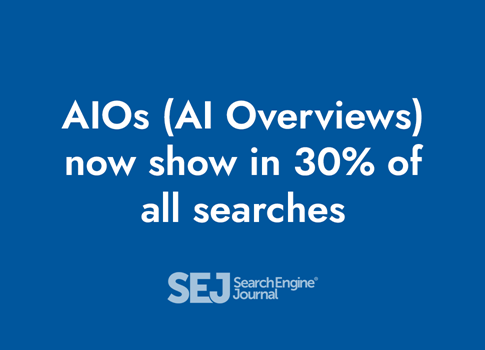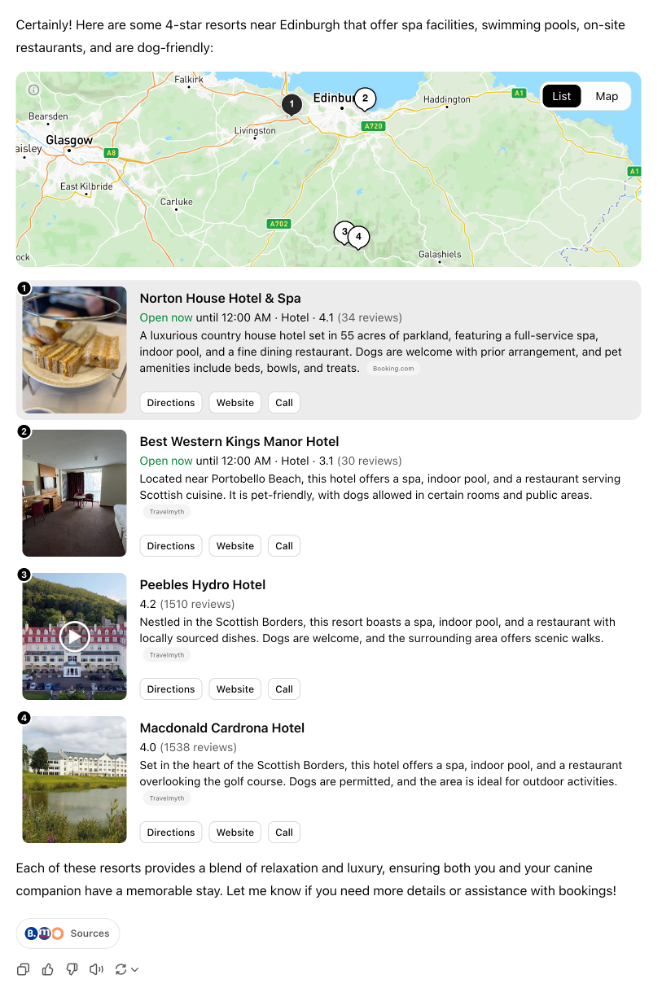Oh great, another acronym!
The digital marketing landscape for hotels is undergoing a significant transformation, driven by the surging adoption of AI-enabled search and usage of intelligent AI agents like ChatGPT. This transformation necessitates a new approach to maintain your hotel's online visibility.
Introducing yet another acronym, because we don't have enough in hospitality already!;
GEO or Generative Engine Optimisation.
With over 20 years of hotel SEO mastery and GEO front-of-mind, our websites are ready for a new era of hotel search. Are you?

A New Era Of Search
The widespread adoption of conversational AI is striking. ChatGPT now boasts over 400 million active weekly users according to Backlinko. This figure doesn't even account for its significant competitors in the AI agent space, including Gemini, Perplexity, Claude, and Microsoft's CoPilot. Collectively, visits to AI agents have grown significantly; by 67% in just 12 months.
This surge in AI agent usage is occurring alongside the increasing frequency of AI-enabled search experiences. Recent research from SEJ reveals that AI Overviews (AIOs) are now integrated into 30% of all search results, fundamentally altering the search landscape. Traditional search engines are also actively testing AI chatbot functionalities within their platforms. Bing introduced its Copilot Chat feature in 2023, and Google is currently experimenting with its AI Mode chatbot in the United States.
With Gartner reporting that traditional search engine volumes will drop 25% by 2026, it's clear that search marketing is beginning to lose market share to AI-enabled search and AI agents.
GEO will become essential to boost your brand’s visibility in this new era of search, while attracting targeted traffic to your website and turning visitors into loyal guests.
What is GEO?
GEO stands for Generative Engine Optimisation and is the process of optimising your website’s content to ensure it is accurately understood, used, and prioritised by AI-driven search engines and AI agents.
One way hotel websites can support this is by structuring content clearly and consistently – for example, by using FAQs, amenity descriptions, and using natural, conversational language in blog posts.
Hotel Schema and other relevant markups makes your website’s content more easily understood by AI-driven search engines, while Digital PR and brand citations signal authority and relevance, helping AI prioritise your content over competitors.
GEO ultimately boosts your brand's presence in AI-powered search results for queries related to your hotel, destination, services, and other relevant themes.
It works alongside traditional hotel SEO methods to help users discover your brand and it helps you to stay ahead of the competition in this new search landscape.
What are the differences between SEO and GEO?
Traditional SEO primarily targets organic listings ('blue links') in SERPs (Search Engine Result Pages), as well as complementary search features, including local listings, featured snippets, 'people also ask' results, images and videos.
On the other hand, GEO focuses on contextually relevant responses generated by AI-powered search engines.
While SEO and GEO share many similarities, there are some differences too:
- Strategy: SEO is primary informed by keyword research. GEO involves analysing how AI systems generate content, prioritise sources, and evolve over time, adjusting content strategies to match AI preferences and behaviours.
- User intent: SEO matches keywords to search queries, while GEO leverages advanced AI models to understand and anticipate user intent, delivering more precise, context-aware responses.
- Content structure: SEO structures content for web crawlers and traditional indexing. GEO focuses on structuring content in a way that AI can easily process - using structured data and friendly formats for natural language processing.
- Brand authority: traditional SEO relies on 'dofollow' backlinks from relevant, authoritative websites. GEO focuses on brand citations from relevant sources.
- Performance tracking: traditional SEO KPIs (Key Performance Indicators) include keyword rankings, organic traffic and conversions. GEO tracks cited sources and referral traffic from AI search engines.
What are the key benefits of GEO?
As the search landscape evolves with the integration of AI-driven features, GEO is essential to maintain your hotel's visibility on the platforms where your target customers are increasingly spending their time.
Some of the key benefits of hotel GEO include:
- Increased reach: GEO increases visibility in AI-generated answers, which helps reach prospective customers beyond traditional search engines.
- Driving direct bookings: GEO combined with traditional SEO methods ensures your hotel website is featured in AI-driven search results as a trusted information source, instead of a third-party booking site, for example an OTA (Online Travel Agent).
- Competitive advantage: early adoption of GEO will position your brand as a leader in this new landscape, while increasing visibility against the top competitors.
- Brand authority: optimising for AI platforms helps establish your hotel brand as a trusted source.
- Brand awareness: GEO increases awareness of your hotel in specific destinations, enhancing brand recall during travel itinerary planning.
- Future-proofing your digital strategy: as search evolves into a more conversational, AI-driven experience, GEO helps your content remain visible and competitive in a landscape where traditional SEO alone won’t be enough.
The Importance of GEO for Hotel and Hospitality Brands
Generative Engine Optimisation is essential to streamline the guest experience from research to booking by helping AI systems provide users with the information they are specifically looking for.
AI-driven search engines often surface content from trusted sources and authoritative websites. By ensuring that your content is AI-friendly, you can increase direct traffic to your hotel’s website and improve the chances of securing more direct bookings.
For example, the screenshot below shows a response from ChatGPT for the query “Can you recommend a 4-star resort near Edinburgh with spa and swimming pool, that also has a restaurant on site? It should also be dog friendly”.

These AI-driven search results list both the hotel name and a link to their respective website, which could be a valuable source of traffic and bookings.
The hotel websites featured in this AI answer include relevant content about their spa facilities, swimming pool and level of dog friendliness. This shows how dedicated pages for “Services”, “Amenities” or “FAQs” with optimised content can contribute to ranking in AI-driven search engines.
However, the fact that the principle sources of information for all four results are third parties (e.g. Booking.com) suggests that ChatGPT has struggled to find the information it needs on the official hotel website.
A better approach to structured information, technical SEO as well as brand citations may well have helped in this example as they enhance content discoverability, authority and local relevance.
In Summary
As generative AI continues to transform how guests discover your brand online, Generative Engine Optimisation is not merely a trend; it represents a fundamental shift in hotel digital strategy.
By prioritising content that resonates with AI, hotels can future-proof their visibility, enhance their reach to potential guests, and cultivate lasting loyalty in an increasingly competitive market.
Embracing GEO ensures that hotels remain visible in the evolving landscape of AI-driven search, positioning them at the forefront of how travellers find and choose accommodation.
Need support with GEO (Generative Engine Optimisation) for your hotel?







